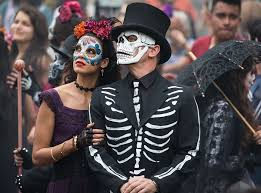
Halloween is a holiday celebrated each year on October 31, combining ancient traditions and modern festivities.
It originated with the Celtic festival of Samhain, a harvest celebration marking the end of summer and the beginning of winter. Ancient Celts believed that on this night, the boundary between the worlds of the living and the dead was thin, allowing spirits to visit the earth. People wore costumes and lit bonfires to ward off wandering spirits, hoping to protect themselves and their homes.
As Christianity spread, the festival blended with All Hallows’ Eve, the night before All Saints’ Day on November 1, dedicated to honoring saints and martyrs. Over time, Halloween evolved, especially in the United States, where immigrants brought their autumn traditions, like carving pumpkins and telling ghost stories. By the 20th century, it had become the holiday of costumes, trick-or-treating, and community festivities that we know today.
Today, Halloween is celebrated with a mix of traditions, from costume parties and haunted houses to storytelling, decorations, and honoring those who have passed. While often seen as a playful holiday, Halloween also offers a chance to connect with themes of remembrance, the cycle of life, and the mysteries of the unknown.
Halloween can be celebrated in many ways, from traditional activities like dressing up, trick-or-treating, and decorating with spooky themes to more personal or meaningful practices that honor the holiday’s roots. Here are some ideas for acknowledging and celebrating Halloween, along with insights into how other cultures observe similar traditions:
Ways to Celebrate Halloween
- Host a Costume Party: Invite friends and family to dress up as their favorite characters or spooky figures. You could even add themes or costume contests to add a creative twist.
- Create a Haunted House: Transform your home or yard with eerie decorations, dim lighting, and sound effects for an authentic haunted experience.
- Engage in Storytelling: Share ghost stories, legends, or folklore with family and friends. This can include traditional ghost tales or personal spooky experiences.
- Carve Pumpkins or Make Lanterns: In keeping with the Irish and Scottish tradition, carve jack-o’-lanterns or make lanterns to place outside your home to ward off spirits.
- Set Up a Memorial for Loved Ones: Since Halloween has roots in honoring the dead, setting up a small memorial or lighting candles can be a meaningful way to remember those who have passed.
- Watch Classic Halloween Movies: Spend the evening watching horror films or family-friendly Halloween movies, depending on your preference.
How Other Cultures Celebrate Similar Traditions
- Día de los Muertos (Mexico): This Mexican holiday, or “Day of the Dead,” takes place on November 1 and 2. Families create altars (ofrendas) to honor deceased loved ones, decorated with photos, favorite foods, marigold flowers, and sugar skulls. Parades, face painting, and traditional music are also part of the vibrant celebration, as it is believed that the souls of the deceased return to be with their families.
- Samhain (Ireland and Scotland): Samhain, the Celtic festival that Halloween evolved from, is still celebrated by some in Ireland and Scotland. People light bonfires, dress up in costumes, and set up food offerings. In modern times, it has blended with Halloween, but traditional Samhain gatherings emphasize spirituality, honoring ancestors, and reflecting on the cycle of life and death.
- Pchum Ben (Cambodia): This Buddhist festival, also known as the “Festival of the Ancestors,” takes place in September or October. It involves visiting temples, making food offerings, and praying for the spirits of deceased family members. It is a time for families to reconnect and honor their ancestors’ spirits, which are believed to return to the earth during this period.
- Qingming (China): The Qingming Festival, or “Tomb-Sweeping Day,” is celebrated in early April. Families visit ancestors’ graves to clean and maintain them, offer food, burn incense, and make other symbolic gestures to honor and show respect to their ancestors.
- Obon (Japan): In August, the Japanese celebrate Obon, a festival honoring deceased family members. Families prepare food, dance, and light paper lanterns, which are often floated on rivers or in the ocean as a symbolic farewell to the spirits of the dead.
Celebrating Halloween in a way that is personally meaningful can be enhanced by learning from these global traditions that also honor life, death, and the connections that continue beyond.
